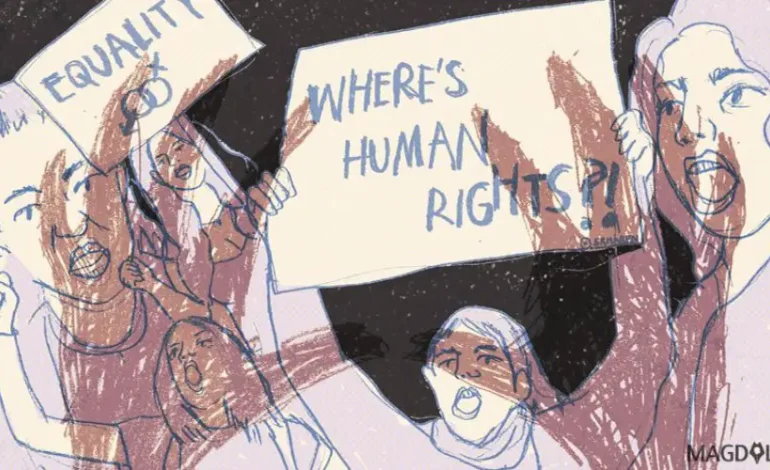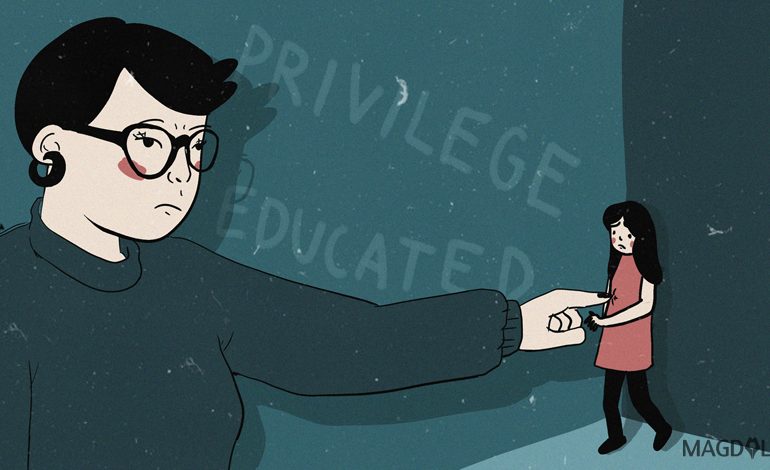What Women’s Rights? Disappointing residential Debate Missed the Point

Going into the first presidential candidate debate last month, most feminists had had low expectations, predicting women and the LGBTQ community would be left out of the discussion on human rights issues.
This assumption was proven right, at least partially. In the first half of the debate the two male candidates explained their ideas for their presidency without even mentioning women’s rights. President Joko Widodo acknowledged his poor performance in addressing past human rights cases, while Prabowo Subianto placed emphasis on tackling economic problems that he believes are the roots of legal and human rights issues.
Surprisingly, Jokowi, as the President is popularly known, then pressed Prabowo by asking about the lack of female representation within his Gerindra Party structure. To this, Prabowo reasoned that his party was new and that members were accepted based on first-come-first-served basis, most just happened to be male.
His statement contradicted a personal story from Halida Hatta, the former deputy social welfare in Gerindra. Hatta had testified that Prabowo had invited her to join the party and nominated her as a deputy, but her legislative candidacy was eventually cancelled due to internal politics.
In the debate, Prabowo vowed to improve the party’s performance in achieving gender equality, claiming it had already begun to do so. He pointed out that in this election almost 40 percent of Gerindra’s legislative candidates are female, exceeding the 30 percent legal threshold, making it the party with the highest number of female legislative candidates. This claim was easily debunked, however, as the five-year old party Partai Solidaritas Indonesia (PSI) has 45,56 percent or 262 female candidates out of the 575 members in the upcoming election.
Jokowi boasted his “pro-gender equality stance” by pointing out that he appointed nine women in his cabinet – though one of them, Social Affairs Minister Khofifah Indar Parawansa, has since resigned to run for East Java gubernatorial election last year. He also mentioned the all-female KPK selection team that he proposed in 2015.
But is this enough to say that he is pro-gender equality?
Prabowo raised a good point when he said that we could not only rely on a high number of women in strategic positions. We also need to see whether these appointments will translate into benefits for the marginalized group, particularly women, he said.
That is actually the main goal of affirmative action. Feminists believe that we cannot only rely on men to bring more gender sensitive policies because they do not share the same experience as women. Therefore, at least 30 percent of the legislature should comprise women to counter policies that disadvantage women.

Indonesia’s Performance on Gender Equality
Ironically, during the debate Jokowi did not credit female ministers Puan Maharani, the Coordinating Minister of Human Development and Cultural Affairs; Yohana Yembise, the Minister of Women Empowerment and Child Protection; and the former Minister of Social Affair – all of whom are responsible for programs supporting the empowerment and protection of women.
This omission invites questions about his level of preparation for the debate, particularly since he was the one who had raised the topic. The significance may be two-fold: either his understanding of gender equality is limited to increasing the representation of women in strategic positions, or the ministers’ performance had not been strong enough to report on – though quoting their number had been useful for scoring points off Prabowo.
Indonesia’s position in regards to gender equality is actually not bad. According to Equality Measures 2030, a new index to measure gender equality in the Sustainable Development Goals (SDGs), Indonesia has one of the highest scores in gender equality among six countries that include Colombia, El Salvador, India, Kenya, and Senegal. It highlighted four areas of the country’s strong performance: Goal #1 on poverty, Goal #4 on education, Goal #5 on gender equality, and Goal #17 on partnerships.
The achievement in poverty is indicated by the decreasing number of people living below the poverty line to 11 percent, and by the fact that 76 percent of social assistance has reached 20 percent of the poorest. In respect to education, Indonesia has one of the highest literacy rates in Asia for both females (93.6 percent) and males (97.2 percent).
The high score of goal #5 is reflected by the low rate of reported cases of early and forced marriage and the high number of women in senior positions in the government; while partnerships are shown by the progressive tax system and openness of gender statistics. Aside from that, the national healthcare system, Jaminan Kesehatan Nasional (JKN), is seen as having successfully reduced maternal mortality.
An Urgent Need to Eliminate Sexual Violence
Despite these achievements in gender equality scores, many aspects still need improvement. Most critical of them is the protection of women from violence and discrimination.
The 2016 Indonesian National Women’s Life Experience Survey shows one in three women have experienced physical and/or sexual violence in their life. The National Commission on Violence against Women noted a sharp increase of cases by 74 percent from 2016 to 2017. The highest percentage goes to domestic violence at 71 percent while sexual violence is severe in public sphere at 76 percent of the 3,528 cases. These statistics are only the tip of the iceberg, as many cases of violence against women remain unreported.
There is limited institutional support for victims of sexual violence. Just recently, a presidential regulation confirmed that the national healthcare system does not cover facilities for sex abuse victims, as it is supposed to be covered by Witness and Victim Protection Agency. However, the latter has a very limited budget, the majority of which goes into operational spending, not victims’ support.
Also, activists are currently pushing Parliament to pass the Elimination of Sexual Violence Bill, which will expands the definition of sexual violence and regulate the fulfilment of victims’ rights, including medical and psychological recoveries. But the effort has been hampered by the religious conservative camp, which claimed that the bill would undermine family values and give space to same-sex relationship. A strong support from the government is needed to pressure parliament to pass the bill.
Throughout the debate, neither Jokowi nor Prabowo have shown satisfactory commitment to uphold women’s rights and protect women from violence. The numbers clearly show how alarming the problem is in Indonesia, but there is no sufficient system to protect girls and women from violence. If they really cared about gender equality beyond attracting the sympathy of women voters, they should not have missed this point in the first place.
Dyah Ayu Kartika (Kathy) is a researcher for Pusat Studi Agama dan Demokrasi (PUSAD) Paramadina and New Mandala Indonesia Correspondent Fellow for Gender Issue. She is struggling to overcome her fear: writing.
Illustration by Sarah Arifin.






















